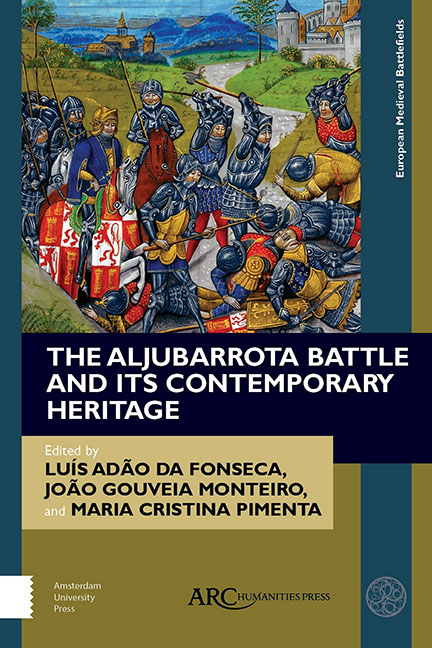Book contents
- Frontmatter
- Contents
- List of Illustrations
- Introduction
- Chapter 1 Before Aljubarrota
- Chapter 2 Fighting a Battle in the Middle Ages
- Chapter 3 The Decision to Fight at Aljubarrota
- Chapter 4 The Decisive Battle
- Chapter 5 Casualties and the Aftermath
- Chapter 6 Contemporary Memory and Myth-Making
- Chapter 7 The Legacy for Later Memories
- Chapter 8 The Battle of Aljubarrota Interpretation Centres
- Select Bibliography
- Index
Chapter 1 - Before Aljubarrota
Published online by Cambridge University Press: 20 November 2020
- Frontmatter
- Contents
- List of Illustrations
- Introduction
- Chapter 1 Before Aljubarrota
- Chapter 2 Fighting a Battle in the Middle Ages
- Chapter 3 The Decision to Fight at Aljubarrota
- Chapter 4 The Decisive Battle
- Chapter 5 Casualties and the Aftermath
- Chapter 6 Contemporary Memory and Myth-Making
- Chapter 7 The Legacy for Later Memories
- Chapter 8 The Battle of Aljubarrota Interpretation Centres
- Select Bibliography
- Index
Summary
THE PRIMARY OBJECTIVE of this chapter is to consider the national and international context surrounding the Battle of Aljubarrota (August 14, 1385). This subject has been addressed by various Portuguese and international historians, albeit in a somewhat oblique manner, both with regard to reflections on the actual battle as well as the period in which it occurred. As one of the most researched and heavily discussed topics in Portuguese history, we believe it is interesting to reconsider this issue and enquire as to what extent Portugal's relationship with the other kingdoms of Europe in the fourteenth century allows us to place the Portuguese National Crisis of 1383–1385 and, even more so, its military expression in Aljubarrota, within the wider context of what has been called the Hundred Years’ War.
The Historical Context
The final decades of the fourteenth century were troubled, with a profound demographic and economic crisis that affected Western Europe after approximately three centuries of continuous growth following the “millennium.” Food supplies were problematic: insufficient agricultural crop yields from 1314 to 1317 were recorded in a large part of Western Europe, where agricultural activity was the main engine of the economy. At the same time, social tensions intensified and were often directed towards those who held or represented authority, whether bishop, lord, or officer of the king. As a result, weak physical resistance meant populations were susceptible to systematic outbreaks of epidemics, notably the mid-century Black Death. This was an endemic disease which, from sources available, arrived in Europe by sea through Genoese merchants with eco nomic interests in the Crimean Peninsula. Almost all of Europe was seriously hit by this disease, but it is difficult to get definitive figures on the overall death-rate. This led to depopulation, an aspect that would eventually become one of the main obstacles to economic recovery, and loss of faith in the Church in the face of such human decima-tion, some seeing it as punishment from God. This opened the door to spiritual disorder embodied in either rigorous morality or a turn to heresy.
In Portugal, manifestations of these broader phenomena were felt in many aspects of social life and strongly influenced the framework of political action in the fifteenth century.
- Type
- Chapter
- Information
- Aljubarrota Battle and Its Contemporary Heritage , pp. 1 - 18Publisher: Amsterdam University PressPrint publication year: 2020



